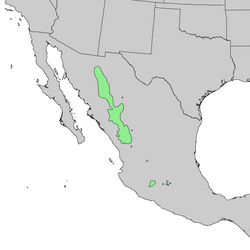| Pinus durangensis | |
|---|---|
 | |
| Scientific classification | |
| Kingdom: | Plantae |
| Clade: | Tracheophytes |
| Clade: | Gymnospermae |
| Division: | Pinophyta |
| Class: | Pinopsida |
| Order: | Pinales |
| Family: | Pinaceae |
| Genus: | Pinus |
| Subgenus: | P. subg. Pinus |
| Section: | P. sect. Trifoliae |
| Subsection: | P. subsect. Ponderosae |
| Species: | P. durangensis |
| Binomial name | |
| Pinus durangensis | |
 | |
| Natural range of Pinus durangensis | |
Pinus durangensis, the Durango pine or pino real is a pine tree species endemic to the Sierra Madre Occidental mountain range of north-western Mexico.
Contents
This species is related to Pinus ponderosa (Ponderosa pine), and included in the same subsection Ponderosae.
